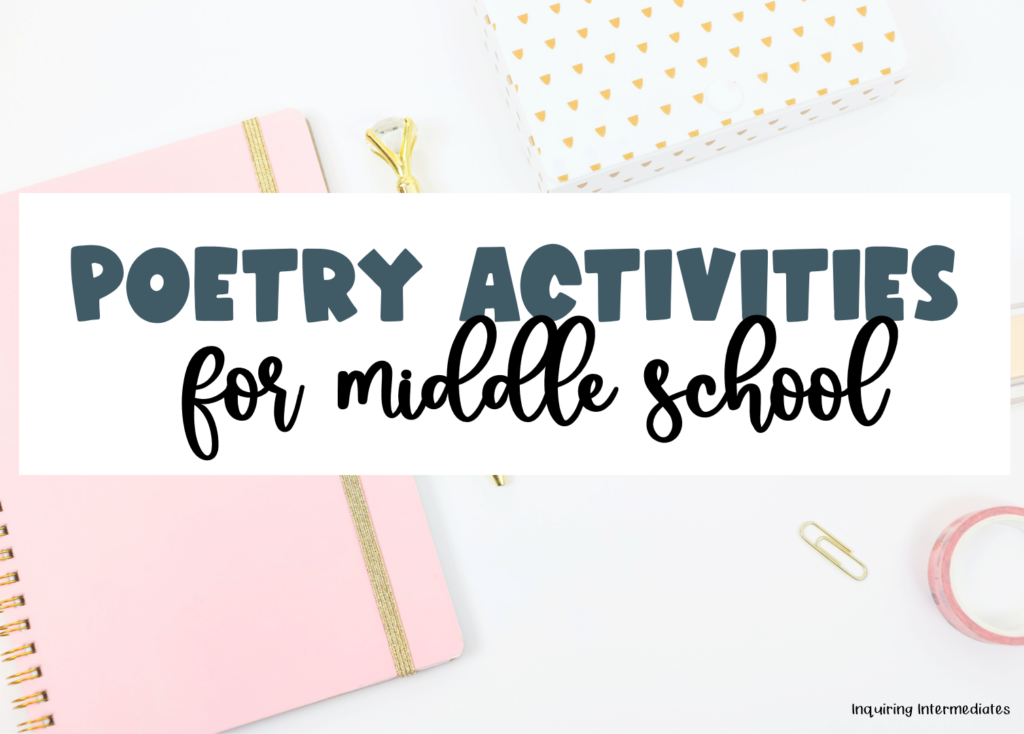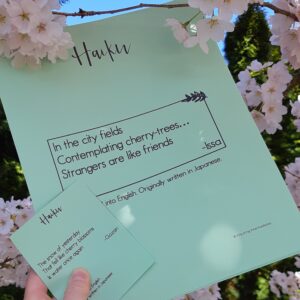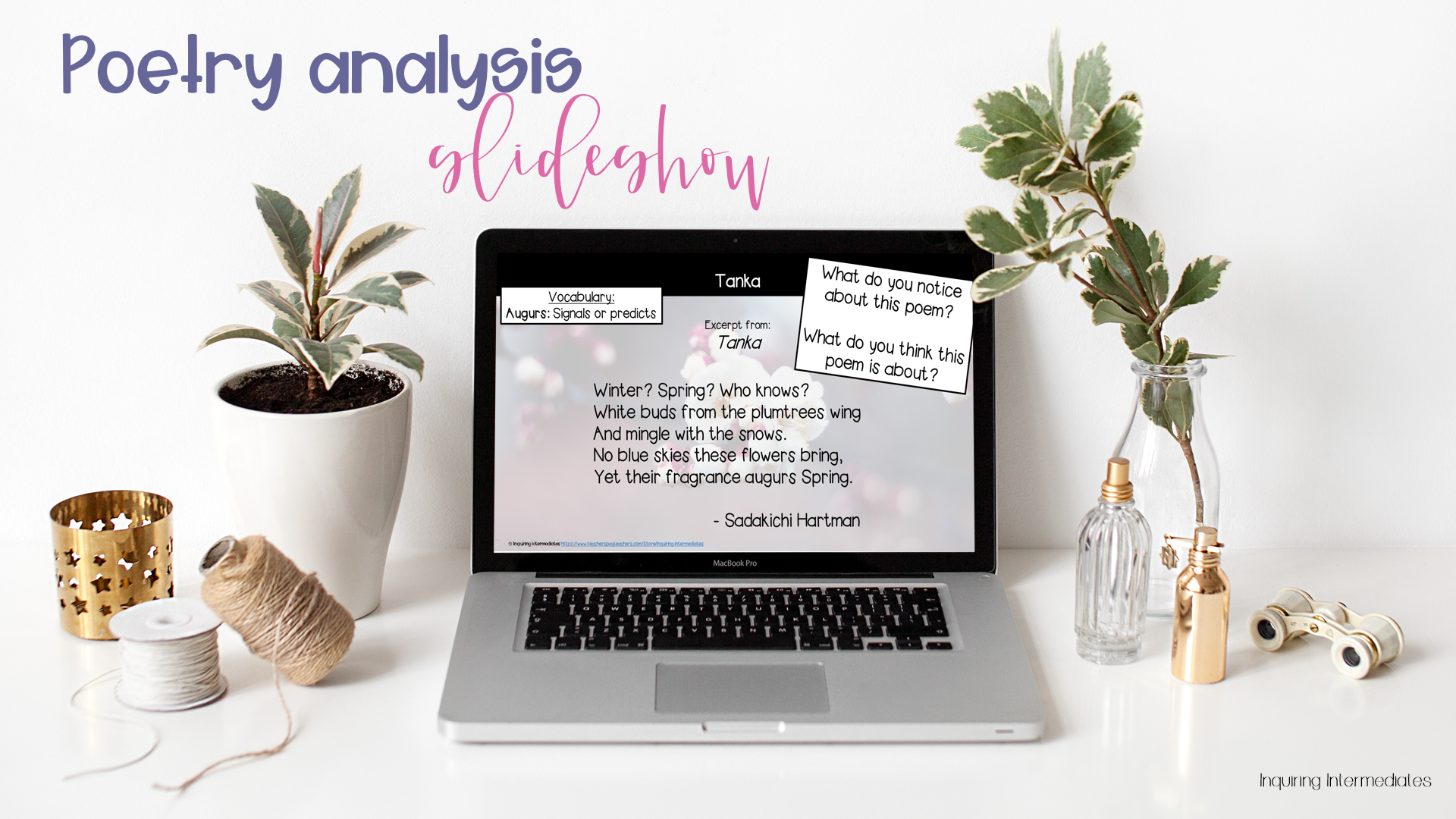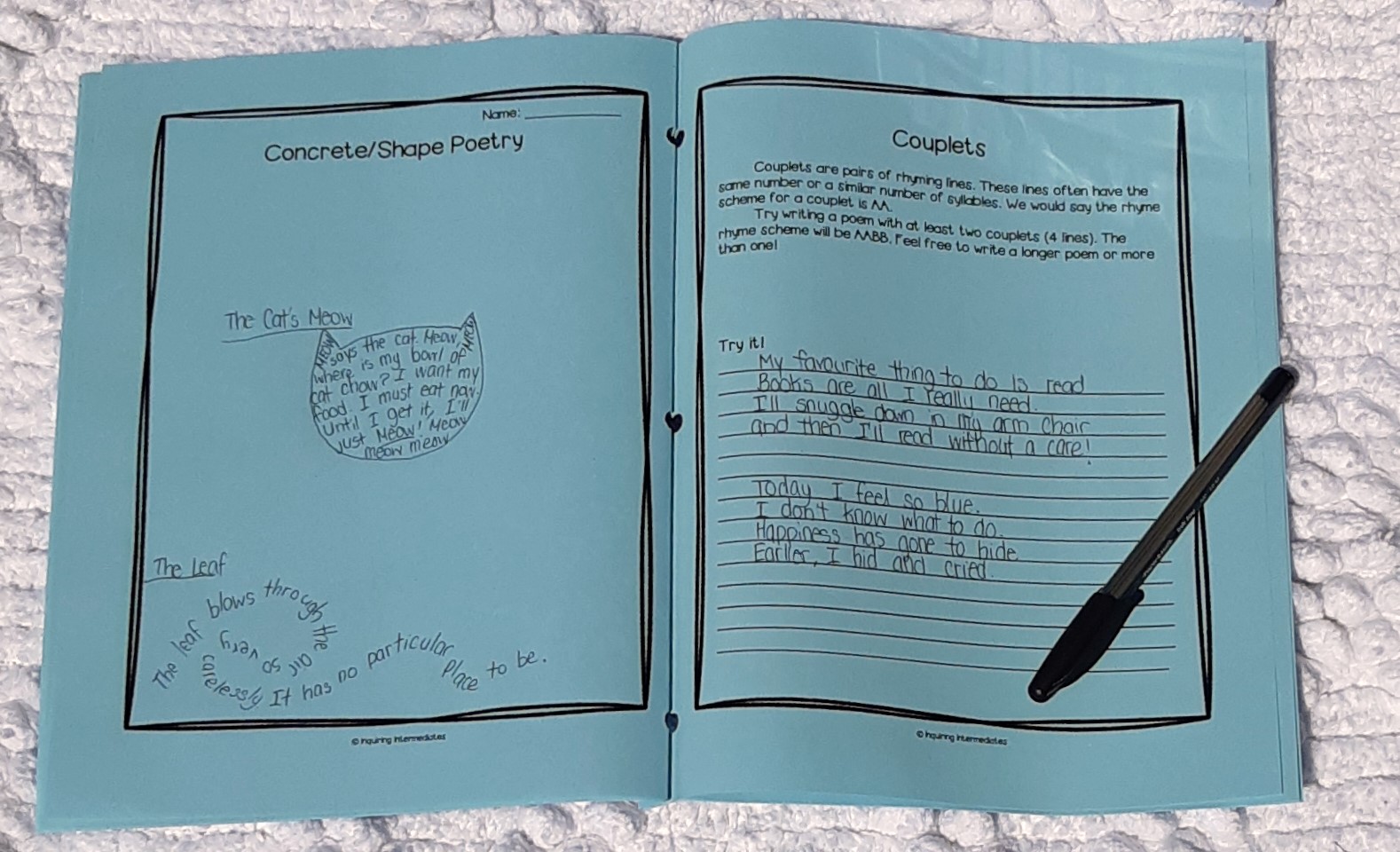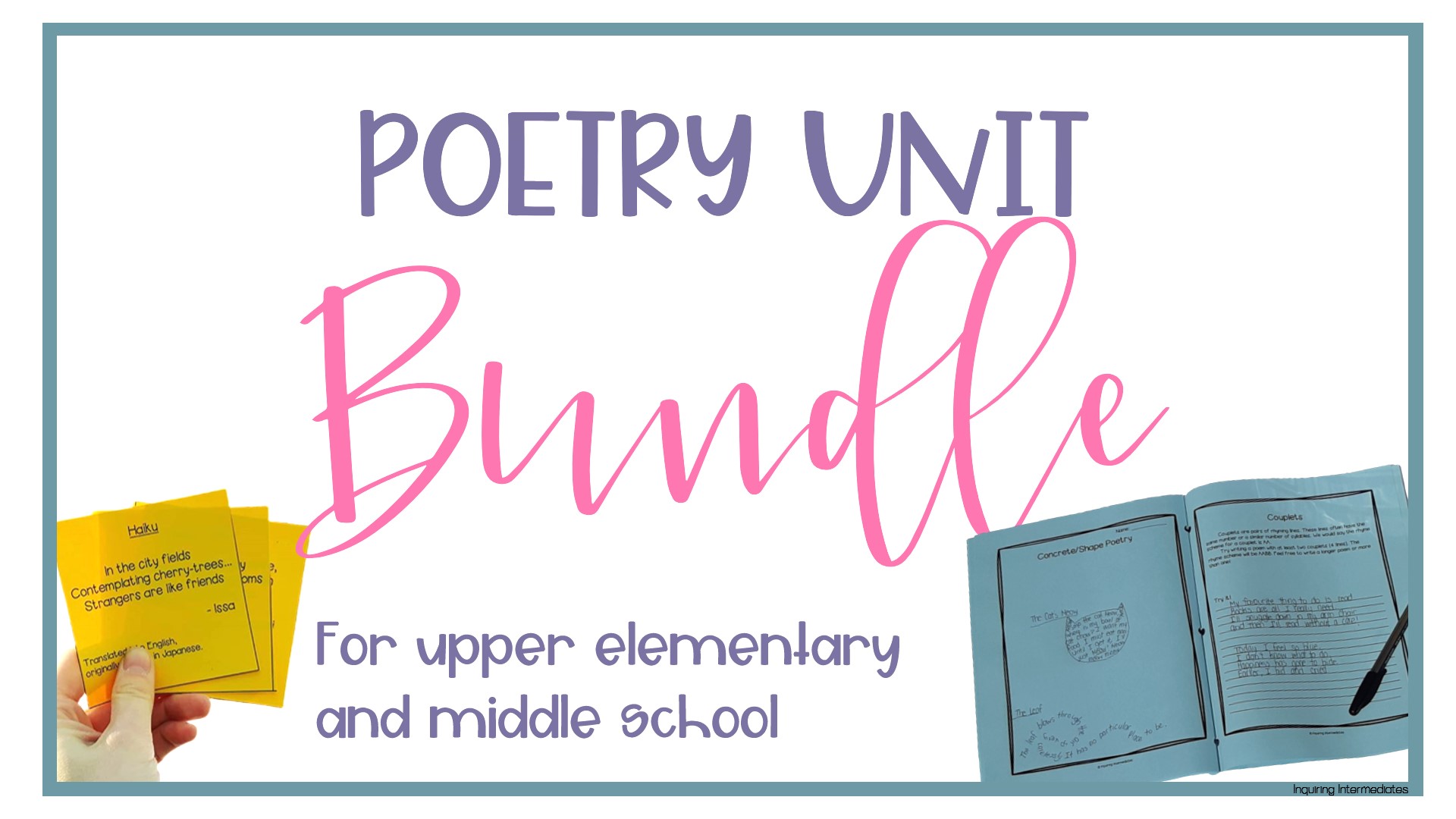I’ve found that poetry is something that most teachers either love or hate! I LOVE poetry and I want to share how you can love teaching poetry in middle school or upper elementary too! Here’s how I usually break down my poetry unit and teach different poetic forms.
Related Post: 11 Fun Poetry Activities Middle School Students will Love
Lesson 1: What is poetry?
I always like to start by gathering at the carpet and asking what poetry is. Invariably, someone will say it’s about rhymes and then someone else will jump in and remind everyone about acrostics or those infernal “I Am” poems that you’ll never find outside of a classroom. I also ask if anyone knows of any poets or can recite any poems. This tends to be where the nursery rhymes come out. Then I say something that blows most ten-year-olds’ minds: Many poems rhyme, but many do not.
Key Points:
- Poetry sometimes uses rhyme and sometimes uses metre. I’ll give them an example like “twinkle twinkle little star/ how I wonder what you are” while showing the meter with my hand movements. However, some poetry is just about expressing yourself without worrying about writing rules.
- Poetry is a place for rules and rule-breaking. Different kinds of poems have ‘rules’, and I want them to follow those rules… for now. They can break them later after they’ve shown me that they experimented with following them.
- Poetry is where we get to ditch sentences and paragraphs in favour of lines called verses. The way a poem looks on a page is often very different than the way prose looks (and because most of them don’t know yet, I explain that prose is the kind of text we see in most non-graphic novels).
- One thing I love about poetry is that we can be a bit cryptic and unclear about what we mean if we’re not sure we want to share certain things with our readers just yet. We can make them wonder a bit. This makes poetry a good way to express emotions that you’re still figuring out.
- Poetry can express the deepest, darkest emotions.
- Poetry can be like playing with words.
Next Few Weeks: Introducing and experimenting with new poetic forms
Sample Poems for Middle School and Upper Elementary
The first thing I do when I teach a poetic form is introduce my students to it with real examples. I like to use these poetry gallery walk posters. I hang the posters around the room (or outside our portable on sunny days), and students do a gallery walk. If I don’t have the time to hang them around the room, I use the poetry sample cards instead. They feature the same poems, just on smaller cards that students pass along to the person beside them after they’re done reading.
As they read the poems, they try to see what the ‘rule’ is for that kind of poem. Most of these are what my students often call “real” poems, i.e. poems that aren’t written for kids. For kids whose exposure to poetry has often been limited to Shel Silverstein and Dr. Seuss, this can be very exciting! I love teaching poetry in 5th grade because they’re at an age where they can start writing more complex rhymes and meaningfully poems.
After the students have had time to read the poems, we gather as a group and I ask these questions:
- Does anyone have a poem that they really loved?
- Does anyone have a poem that they just don’t understand and/or want to talk about?
The goal here is to just enjoy poetry and recognize that people have different tastes when it comes to what constitutes a good poem. We work together to help one another understand poems that might be confusing, recognizing that sometimes people will disagree about the meaning of a poem and sometimes authors are purposefully vague.
Teaching Poetry Analysis
Next, we try to find what all the poems have in common so we can determine the ‘rule’. Once we’ve figured that out, we use a slideshow to analyse a few particular poems as a class, looking for proof of the ‘rule’ and doing some basic literary analysis.
Time for writing poetry!
Next, students take out their poetry notebooks and try their hand at writing a few poems in the form that was introduced. These notebooks include an explanation of each poetic form in case students forget. For short poetic forms, I sometimes have them write more than one poem or put a minimum requirement for the number of lines (by grade five I am not going to be impressed with – “There was a cat/ He sat on a mat” anymore).
Now, this next part is something I think is super important: while they start to write, I write too. I think it’s so important to show your students that writing isn’t just something we do when someone else makes us do it!
Then I’ll walk around a bit to give some feedback and do formative assessments to determine who needs extra help. At the end of our poetry block, I ask if anyone wants to share any of their poems; there are usually plenty of volunteers. I make a point of sharing one of mine too, and sometimes I purposefully share one I’m not happy with and ask for feedback. If I think of improvements overnight, I make a point of sharing my revised poem during the next lesson. Again, I’m trying to model behaviour here and I want them to notice that writers make changes.
Wrap-up Sessions & Celebrations
To wrap up our studies in poetry, I like to do two culminating activities: a poetry anthology, and a poetry café.
Poetry Anthology Project
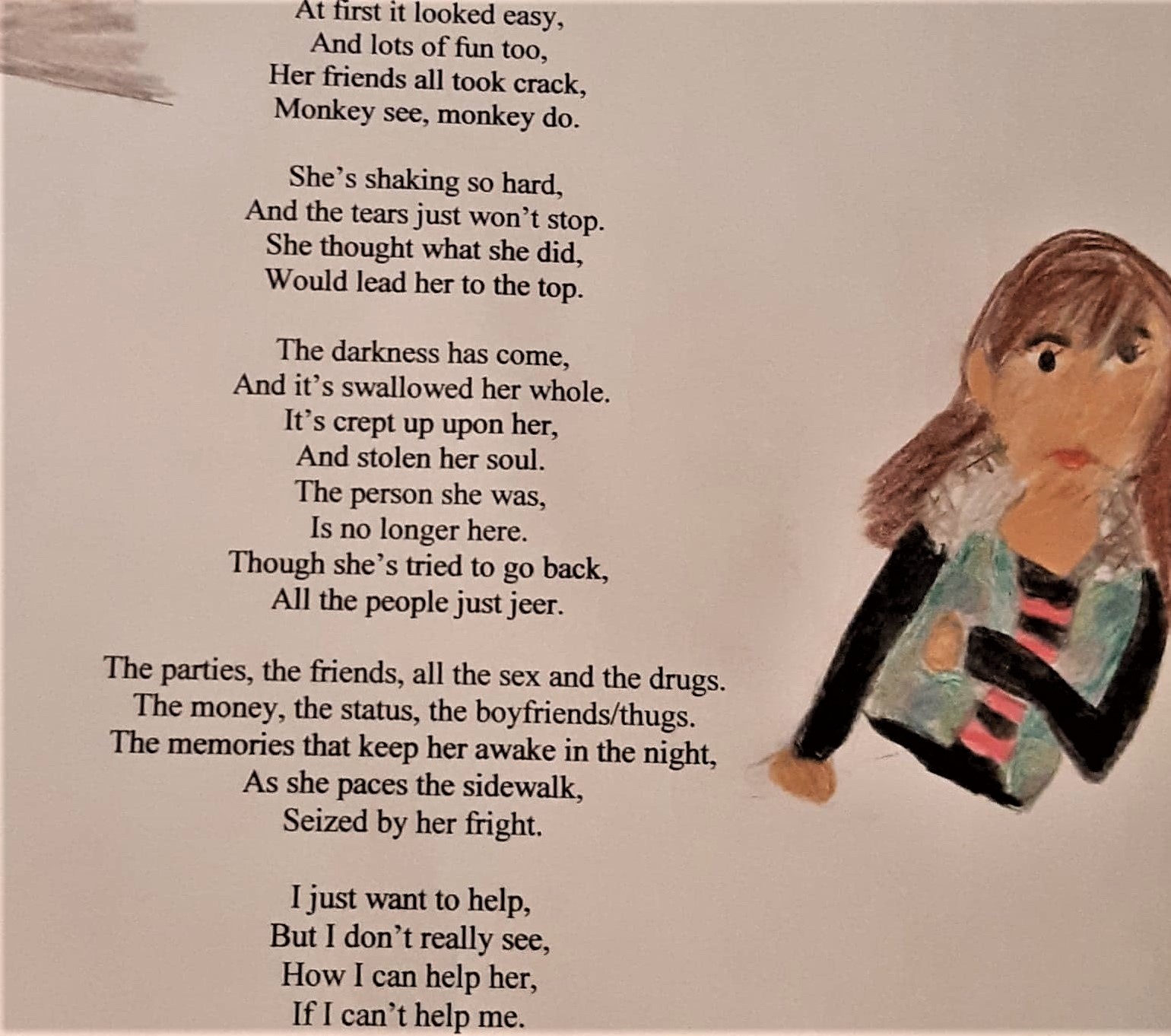
I’ve done the poetry anthology project a few different ways: slideshows, books, and brochures. I do not have kids include every poem they wrote for this unit in their anthology. I don’t even ask them to include one of each poetic form. In my province, there are no specific requirements for poetic forms that need to be taught. I think this is fantastic because I don’t think that students should have to be marked on multiple different poetic forms if they don’t want to be. Not all poets excel in all poetic forms and I want my students to be able to play to their strengths. Before they begin putting together their anthologies, I give them the rubrics for the project and post a copy on one of the bulletin boards so kids who lose their sheets can reference that one.
When the anthologies are finished, I mark them and then we celebrate with a mini book tasting so classmates can read one another’s work. In the future, I would love to have a bin in the classroom library specifically for the poetry anthologies that students want to leave in the classroom.
Poetry Café
For our poetry café, each student chooses a poem that they love and that is school appropriate. It does not have to be one they have written themselves and they do not have to memorize it, although they are encouraged to. When possible, another teacher and I like to pair our classes up for this because everything seems to be more fun when other classes join in. We gather to eat snacks, listen to one another recite poetry, and snap in appreciation. This is such a fun way to celebrate all the hard work the kids have done!
Teaching poetry to elementary students and middle schoolers can be such a fun way to play with language and allow kids to express themselves creatively! What strategies for teaching poetry do you have? Share them in the comments!
All of the products mentioned in this post are available on my TPT store as a bundle and as individual items!
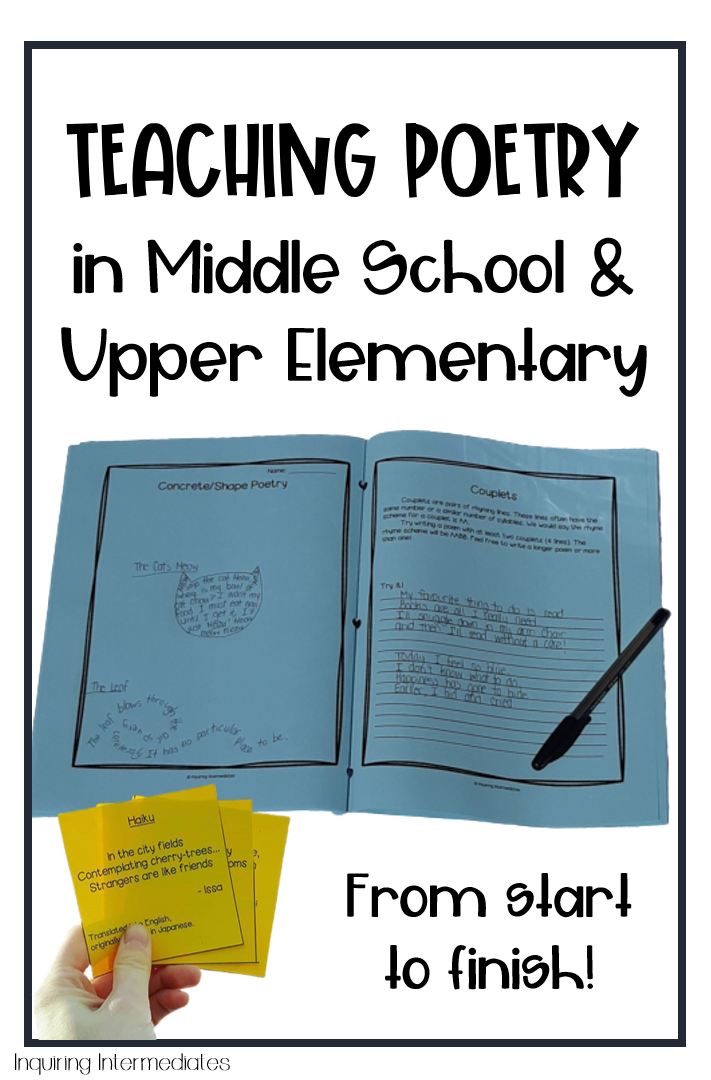
Looking for more poetry ideas? Here are 11 easy-to-implement poetry activities you can use with your students tomorrow!
